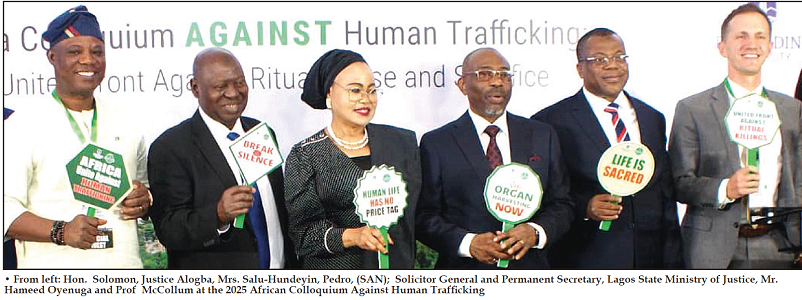Copyright thenationonlineng

Governor Babajide Sanwo-Olu of Lagos State yesterday urged African leaders to form a united continental front against human trafficking and ritual killings. He described human trafficking and ritual killings as “heinous crimes that strip victims of their dignity and humanity.” The governor spoke through the Secretary to the Lagos State Government, Mrs. Abimbola Salu-Hundeyin, at the First Annual Africa Colloquium Against Human Trafficking. The colloquium was convened by the state’s Ministry of Justice and held at Radisson Blu Hotel, Isaac John Street, GRA, Ikeja. Governor Sanwo-Olu said the fight against ritual abuse and human trafficking must transcend borders, institutions, and communities if Africa must reclaim its moral integrity. “Human trafficking is not an abstract problem — it is real and close to home. READ ALSO: Commanding from the front: Tinubu strengthening national security architecture “It affects millions across Africa, especially women and children, through forced labour, sexual exploitation, domestic servitude, and ritual abuse. Behind every statistic is a name, a face, and a story of pain that we must never ignore.” The governor described the colloquium, themed ‘A United Front Against Ritual Abuse and Sacrifice’, as a “continental rallying point for Africa’s moral awakening,” stressing that collaboration among governments, NGOs, law enforcement, and communities is key to dismantling trafficking networks. According to him, “The words ‘A United Front’ remind us that this evil knows no boundaries. It can only be defeated through shared action, intelligence, and compassion. He condemned the myths and superstitions fuelling ritual killings, describing them as “barbaric relics that have no place in a modern, progressive Africa.” “Governments must work with civil society, religious and traditional leaders, and even the private sector to expose traffickers and protect victims”, he said Sanwo-Olu emphasized that public enlightenment remains crucial in breaking the chain of silence that sustains human trafficking and ritual practices. “We must educate our communities about the signs of trafficking and empower them to report suspicious activities. “We must also strengthen our laws to ensure offenders are swiftly prosecuted while victims receive proper care and rehabilitation.” The Governor noted that the Lagos State Task Force Against Human Trafficking, in partnership with the National Agency for the Prohibition of Trafficking in Persons (NAPTIP) and international organisations, has intensified prosecution, public education, and survivor rehabilitation. “But the government alone cannot win this fight. It demands a coalition of justice ministries, law enforcement, community leaders, and faith-based organisations.” “We must defeat these dangerous myths that equate human life with power, success, or protection. “Our progress must be built on knowledge, empathy, and faith in lawful advancement — not blood”, he said. “Let this colloquium mark the day we moved from words to work. “Together, as one united front, we will protect our people, punish the perpetrators, and restore dignity to those harmed”, he said. “This is our moment to declare that our people are not for sale, our children are not sacrifices, and our future will never be built on fear or blood,” he said. The Governor affirmed Lagos State’s commitment to lead Africa’s regional campaign against human trafficking and ritual abuse. The Attorney General of the Federation (AGF) Prince Lateef Fagbemi (SAN), in his address at the colloquium reaffirmed federal government’s commitment to intensifying the fight against human trafficking, ritual exploitation, and migrant smuggling across Africa describing them as “crimes that diminish humanity and betray the principles of human rights.” The AGF who was represented by Team Lead for Trafficking in Persons and Smuggling of Migrants (TIPSOM) at the Ministry of Justice, Mrs. Ezinne Nwokoro, said the government is determined to dismantle trafficking networks through coordinated legal, diplomatic, and community-based responses. Mrs Nwokoro said the Attorney-General of the Federation has prioritized anti-trafficking reform through a combination of legislative review, enhanced partnership with NAPTIP, and expanded international cooperation frameworks. “These reforms are building systems that not only punish offenders but prevent trafficking before it begins,” she said. “We are creating a future where justice is accessible, survivors are supported, and the vulnerable are no longer prey.” She declared the federal government’s full support for the outcomes of the colloquium and urged all participants to move from dialogue to action. “This is not just another event,” she said, adding ,“it is a call to conscience — a gathering of people working, in different ways, to confront the painful reality of human trafficking, ritual abuse, and human sacrifice in Africa.” According to her, ritual-linked trafficking represents an even darker evolution of the crime. “Traffickers no longer just exploit poverty and desperation — they exploit belief systems and cultural fears. “Victims are often made to take oaths or undergo rituals designed to enslave them psychologically, making escape almost impossible. We’ve seen this pattern in cases within Nigeria and from other African countries”, she said. Mrs. Nwokoro noted that this emerging dimension makes collaboration indispensable, adding, “if traffickers can collaborate across borders, so must we. “We need more than laws; we need communities that are vigilant, justice systems that protect, and survivor voices that lead. “Let this not just be a conference,” she said, “but a call to action — one guided by the stories of survivors and the responsibility we all share to protect them. “The fight against human trafficking is not one government’s struggle; it is humanity’s shared duty. Together, we can build an Africa where no one is for sale, no one is sacrificed, and every life is valued,”, he said. The Lagos State Attorney-General and Commissioner for Justice, Mr. Lawal Pedro, (SAN), urged African nations to unite in action against the growing scourge of ritual killings and human trafficking, describing the crimes as “commercialised evil” that thrive on poverty, desperation, and silence.” Pedro said the event was “not just another conference but a continental call to conscience aimed at reclaiming the sanctity of human life in Africa. “Ritual abuse and human sacrifices are not myths. They are real, expanding, and destroying lives across our communities,” the Attorney-General declared. Pedro cited disturbing cases across Nigeria that reveal the deepening connection between human trafficking and ritual crimes. He recalled recent incidents including the abduction and murder of two seven-year-old cousins, Chizaram and Chidinma Onuche, in Port Harcourt; the killing of a college student in Ilorin for ritual purposes; and the arrest of two pastors in Rivers State found with coffins and skulls. “These are not isolated tragedies,” he said. According to him, “the National Bureau of Statistics recorded over 150 ritual killings in six months, many involving youths deceived by the false promise of quick wealth.” He lamented that human trafficking has evolved into a global, organised, and highly profitable enterprise. He described human trafficking as a high-profit, low-risk crime linked to organised criminal networks. He said globally, profits from human trafficking are estimated at 236 billion dollars annually,” he said. Pedro, who also chairs the Lagos State Task Force Against Human Trafficking, outlined the state’s multi-pronged response to the menace. He said: “between 2022 and 2024, over 4,700 victims were rescued and supported, while five million residents were reached through community awareness campaigns.” He highlighted the enactment of the Lagos State Organ Harvesting Prohibition Law 2024, which criminalises organ trafficking and imposes severe penalties on offenders, including medical professionals involved in illegal human organ trade. Pedro stressed that no single nation can win the battle alone, urging African countries to collaborate across borders in prevention, prosecution, and victim protection. “This evil will continue to thrive where nations fail to collaborate,” he said. “Africa must rise — not in rhetoric but in responsibility.” He commended Pepperdine University and the Sudreau Global Justice Institute for partnering with Lagos since 2022 on justice reforms, adding that their collaboration had grown into a continental mission against human trafficking and ritual crimes. “Let history say that from Lagos in 2025, Africa took a stand and never turned back,” he said. “Let us refuse to accept the killing of our children as normal, reject the exploitation of women, and silence that empowers crime. When Africa chooses unity over isolation, we can protect the vulnerable and safeguard human dignity.” The Chief Judge of Lagos State, Justice Kazeem Alogba, in his address, described human trafficking and ritual abuse as a global pandemic deeply rooted in the history of slavery. He called for stronger community vigilance, legal enforcement, and international collaboration to eradicate the menace. Justice Alogba urged local communities to take the lead in identifying and reporting suspicious activities. “If the community does not perceive human trafficking and ritual abuse as wrong, perpetrators will continue to go unpunished. Every citizen must be their neighbour’s keeper,” he added. Justice Alogba lamented that centuries after the abolition of slavery, its modern offshoots — human trafficking, ritual killings, and organ trade — still thrive under different guises for economic purposes. “Ritual abuse and sacrifice are grim offshoots of slavery, initially driven by economic motives,” he stated. The Chief Judge stressed that the problem cannot be effectively addressed without tackling the social and cultural beliefs that continue to justify the exploitation of human beings. “Our cultural ethos must be properly investigated. The use of human beings for rituals or any form of abuse, no matter how it is rationalized, is evil. The fight must start from our communities,” he said. Justice Alogba emphasized the need for proper training and motivation for law enforcement and investigative officers, describing them as the “foot soldiers” in the anti-trafficking campaign. According to him, traffickers are now well-organized and heavily funded, requiring equal sophistication in combating their operations. While acknowledging the efforts of the Lagos State Government, Justice Alogba commended the legislature for enacting stiff penalties against offenders and pledged that the judiciary would enforce the law with strictness. “The Lagos judiciary will ensure that anyone found guilty of trafficking or ritual abuse faces stringent punishment in accordance with the law,” he assured. The Chief Judge called for broader collaboration beyond Africa, noting that trafficking networks have become intercontinental. He concluded by stressing that sustained public sensitization and awareness are critical to winning the battle. “Government, communities, and individuals must unite against this social pandemic. Sensitization and education remain our strongest tools,” he said. The Director-General of the National Agency for the Prohibition of Trafficking in Persons (NAPTIP), Mrs. Binta Bello warned that the growing nexus between ritual abuse, human sacrifice, and human trafficking poses a grave threat to Africa’s moral fabric and security. The NAPTIP DG who was represented by the Director of Intelligence, Mr. Josiah Emerole, described ritual-linked trafficking as one of the “darkest and most complex forms of human exploitation” that has for too long escaped direct confrontation. “The intersection between ritual abuse and human trafficking is not theoretical — it is a lived reality for countless victims,” she said. “In Nigeria and across West Africa, young people are being trapped in cycles of exploitation by fear, superstition, and coercion disguised as culture.” She commended the Lagos State Ministry of Justice and the Sudreau Global Justice Institute of Pepperdine University for their courage in convening the colloquium, saying: “It takes boldness to confront issues our societies prefer to ignore — issues that are culturally sensitive and spiritually unsettling. But justice demands courage.” Bello explained that from the early years of NAPTIP’s operations, investigators confronted the use of juju oaths, fetish rituals, and sacrifices to silence victims trafficked abroad for sexual exploitation. “Victims were forced to take deadly oaths before native priests, binding them into fear and obedience,” she said. “These rituals were more powerful than chains; they enslaved the mind.” Although NAPTIP has since achieved major progress — including the 2017 intervention of the Benin Monarch to abolish ritual oaths — Bello lamented that ritual abuse has not disappeared. “It has simply evolved, travelling across borders and taking new forms in destination countries,” she said. She cited a 2008 incident in which a voodoo priest arrested by NAPTIP died mysteriously in custody after warning officers not to cross certain rivers — a case that led to the arrest of NAPTIP officers by police investigators. “Such incidents complicate prosecutions, stall investigations, and sometimes erode public confidence,” she explained. “These crimes are not just spiritual or cultural; they are legal and human rights issues that demand coordinated action.” Bello also revealed that investigating ritual-linked trafficking remains one of the most challenging aspects of law enforcement. The NAPTIP boss cited data from the National Bureau of Statistics showing that over 150 ritual killings were recorded in the first half of 2025 alone, with women and youths as major victims. The National Institute for Legislative and Democratic Studies (NILDS), she noted, also documented over 168 ritual-related deaths in 2022 and nearly 100 in 2024. “These are not random acts of violence,” she stressed. “They are symptoms of a deeper disease — poverty, inequality, erosion of values, and belief in the efficacy of human sacrifice as a path to success. Weak law enforcement and judicial bottlenecks have further emboldened perpetrators.” According to her, the Lagos colloquium marks a historic moment for Africa’s anti-trafficking movement. Bello said the gathering aligns with Nigeria’s National Action Plan on Human Trafficking (2022–2026), which rests on five pillars: Policy, Prevention, Protection, Prosecution, and Partnerships. Bello pledged NAPTIP’s full commitment to implementing the outcomes of the colloquium in collaboration with domestic and international partners. “By putting ritual abuse at the centre of this global discussion, we are redefining the future of counter-trafficking work,” she affirmed. “The lives of our children and women are too precious to be sacrificed at the altar of greed or superstition. The dignity of our people is sacred — and the cost of inaction is far too high.” Director of the Sudreau Global Justice Institute, Pepperdine University, USA, Prof. Cameron Collum, also called for a united African response to end ritual abuse and human sacrifice, describing the practices as “pure evil” that must be confronted through collective action, policy reform, and justice system strengthening across the continent. Prof. Collum praised Nigeria’s renowned hospitality and the choice of Lagos as the host city, saying the state represents “the heartbeat of Africa” and a continental leader capable of influencing change. He explained that Pepperdine University, based in Los Angeles, California, operates on five continents and is committed to using academic resources to make tangible social impact. “We don’t want to be a university lost in academic theories; we want to work alongside leaders to achieve real results,” he said. According to him, Pepperdine’s partnership with Africa began over 20 years ago in Uganda, when the university helped establish a fast-track juvenile justice system that expedited trials for detained minors. The initiative, he said, led to the creation of a broader plea-bargaining system that improved access to justice and reduced prolonged pre-trial detentions. “Uganda’s success story inspired other countries to replicate similar reforms, and today, we are working with nearly 20 African nations on justice initiatives — including anti-human trafficking and rule of law projects,” Collum noted. He stressed that while human trafficking is widely acknowledged and addressed globally, ritual abuse and human sacrifice remain largely unspoken issues. “Everywhere I go, leaders acknowledge ritual killings as a real problem, yet few programs tackle it. This conference aims to change that by starting a Pan-African conversation to end these atrocities,” he declared. Collum said the two-day colloquium was designed to be action-oriented rather than academic, bringing together about 200 delegates from 15 African countries, including policymakers, judges, prosecutors, NGOs, and community leaders. “With collaboration, courage, and leadership from places like Nigeria, I believe we can end the evil of ritual sacrifice once and for all,” he concluded.



